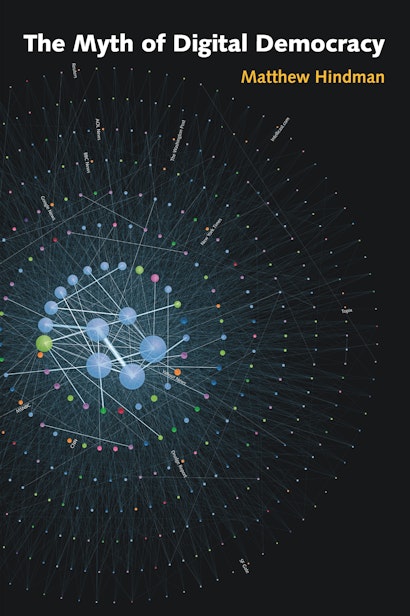Is the Internet democratizing American politics? Do political Web sites and blogs mobilize inactive citizens and make the public sphere more inclusive? The Myth of Digital Democracy reveals that, contrary to popular belief, the Internet has done little to broaden political discourse but in fact empowers a small set of elites—some new, but most familiar.
Matthew Hindman argues that, though hundreds of thousands of Americans blog about politics, blogs receive only a miniscule portion of Web traffic, and most blog readership goes to a handful of mainstream, highly educated professionals. He shows how, despite the wealth of independent Web sites, online news audiences are concentrated on the top twenty outlets, and online organizing and fund-raising are dominated by a few powerful interest groups. Hindman tracks nearly three million Web pages, analyzing how their links are structured, how citizens search for political content, and how leading search engines like Google and Yahoo! funnel traffic to popular outlets. He finds that while the Internet has increased some forms of political participation and transformed the way interest groups and candidates organize, mobilize, and raise funds, elites still strongly shape how political material on the Web is presented and accessed.
The Myth of Digital Democracy. debunks popular notions about political discourse in the digital age, revealing how the Internet has neither diminished the audience share of corporate media nor given greater voice to ordinary citizens.
Awards and Recognition
- Winner of the 2010 Goldsmith Book Prize (Academic Book)
- Winner of the 2009 Donald McGannon Award for Social and Ethical Relevance in Communications Policy Research, awarded by the Donald McGannon Communications Research Center
"Both utopian and dystopian interpretations have been made of the Internet's influence on many spheres of life—and democracy is no exception. . . . Absent from much of this debate is evidence-based analysis of the effects of the Internet on the business of politics. Many theories have been built on nothing more than anecdote, inference and assertion. In The Myth of Digital Democracy, political scientist Matthew Hindman fills important gaps in the evidence base, and does so accessibly."—Richard Allan, Nature
"[T]here is much in Hindman's book that is persuasive, counterintuitive, and important to understanding the moment."—Matt Bai, Democracy: A Journal
"Matthew Hindman's The Myth of Internet Democracy is one of the first significant efforts to bring data to bear on the relationship between the internet and democracy. He argues against the journalists and pundits who have made sweeping claims about the internet's transformative potential for democracy, and suggests that the new online bosses are not very different from the old ones. Unlike earlier sceptics, however, he has some data to support his claims."—Times Higher Education
"This is a well written short book about one aspects of online politics, namely who gets read and heard when it comes to online political debate, which I recommend to any reader interested in the relation between the internet and democratic values. The book is well organized and most of content is accessible to a general readership."—Olle Blomberg, Metapsychology Online Reviews
"Hindman convincingly challenges seemingly sensible claims that online communications are expanding public voice, weakening gatekeeper power, and engaging broader swaths of the citizenry in politics. . . . By bringing new data and methods to bear in a serious critique of what were becoming consensus views about the Internet's role in public life, Hindman offers more than just another set of volleys over the net of ongoing academic debates."—John Kelly, Perspectives on Politics
"The Myth of Digital Democracy . . . make[s] a significant contribution to the scholarship on e-democracy."—Wendy N. Wyatt, Journal of Mass Media Ethics
"Hindman's The Myth of Digital Democracy makes it possible to visualize the whole elephant. Comprehensiveness and rich data support Hindman's central claim about inegalitarian outcomes of the interactions of Internet and politics, and provide an excellent starting point for future research."—Meelis Kitsing, Journal of Politics
"An outstanding combination of theoretical and empirical work. Hindman has produced one of the very few best books, ever, on the relationship between the Internet and democracy. Indispensable reading."—Cass R. Sunstein, author of Republic.com 2.0
"Hindman provides a serious, informed, and methodologically conscientious argument in favor of the position that the Internet has not fundamentally changed the elitist and concentrated structure of the public sphere typical of mass media. He produces significant evidence against both fears of fragmentation of discourse and hopes that we are seeing a more egalitarian and democratic networked public sphere. The contribution is important, and anyone working in this area will have to contend with his data and analysis."—Yochai Benkler, Harvard University
"Many authors make claims about the Internet and politics on the basis of some piece of the problem—by looking just at Web sites or blogs, or by examining link structure, or evaluating some aspect of campaigns for office. Hindman has drawn together many pieces of the puzzle into a coherent whole. This is an ambitious book, and it delivers."—Bruce Bimber, University of California, Santa Barbara
"This book makes a significant contribution to the study of political communication. Hindman's approach provides an extensive and multifaceted view of online political content, its producers, and its audiences. This book breaks new ground in important ways, and is likely to become a modern classic in the field of the Internet and politics."—Diana Owen, Georgetown University


